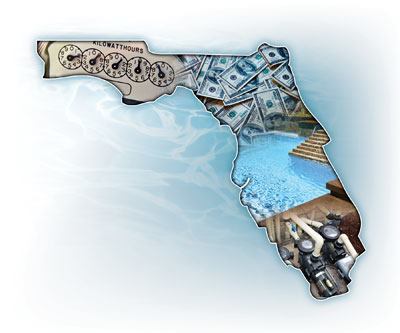As one of Australian retailing’s biggest names takes its first step into the U.S., observers are weighing in on the company’s chances and potential effects on the pool industry.
Last month, 22-year-old Australian retail and service outfit Poolwerx purchased the assets of Phoenix-based Cactus Valley Pools, a firm with 16 locations, half of which are franchised. By late fall, the company will begin rolling out other, similar deals.
Using its franchise model, Poolwerx plans to see its name on 300 stores across the Sunbelt in five years, said its CEO, John O’Brien.
In its home country, the Brisbane, Queensland-based company may be the largest franchiser dedicated to the pool industry, with 85 stores and 300 service vans.
The Cactus Valley deal serves as something of a test case, as Poolwerx uses the next few months in Phoenix to gain its U.S. sea legs. It certainly chose one of the most intense, crowded and price-competitive markets to break into. Local professionals say Cactus Valley used aggressive pricing to gain market share, especially to compete with Leslie’s Poolmart and fellow regional heavy-hitter Nationwide Pools.
But in this regard Poolwerx differs from its acquiree, familiar sources say. O’Brien has introduced himself to some Phoenix professionals and assured them his company competes on quality and maintains margins, said local retailer Dale Howard.
“From the research I’ve done and their own comments, their model is different,” said the president of B&L Pools in Phoenix. “If we could get where everybody could make a little money and not fight constantly over price, that would be great.”
While some expressed frustration at facing another large-scale competitor on top of the Internet, Leslie’s, and Florida’s Pinch A Penny, Howard sees the new player bringing out the best in the industry.
“When you get rid of the discounting and the price wars, then everybody’s got to step their game up,” he said. “I’d much rather fight on quality than price.”
That doesn’t mean Poolwerx won’t pose competition in that area. As it grows, the franchiser will gain buying power, and O’Brien is known as an adept price negotiator back in his home country. “I would believe that Poolwerx in the U.S. … could potentially become another buying-group channel,” said Brian Quint, president of Seattle-based Aqua Quip.
But as others noted, Australia has more manufacturers to bargain with, and distribution plays a weaker role there.
Overall, those familiar with the company or O’Brien believe Poolwerx stands a good chance of succeeding. Sticking with the Sunbelt is a wise choice, they say, because the climate is similar to Australia’s and the company focuses on pool, not spa, supplies. “They’ve already got a lot of the systems in place and have made [their] mistakes, so they know what works and what doesn’t in Australia,” said Charlie Schobel, an industry consultant based in Atlanta.
While Poolwerx may need some adjustments to its model for the U.S. market, the Australian and U.S. industries see the most similarity on the retail side, experts said. And the retail environment may prove most friendly to a franchise model because it lacks the workmanship issues and regulation involved with contracting.
Some question Poolwerx’s aggressive growth plan. “Come on — 300 stores?” said one professional. “They’re going to be almost half the size of Leslie’s in five years? That’s an awful lot. I don’t know…”
As for Poolwerx’s impact on the U.S. industry, many expect a net positive. While another competitive force can seem daunting, observers said, the franchise model may present an exit strategy for veterans, larger backing for independents who want it, or a means for service firms to diversify. “What they’ve done is, [they’ve] been able to help independent pool servicepeople adopt a turnkey franchise model and grow their business,” Quint said.
It also offers an avenue for introducing new blood into the industry. “There’s not really been a successful retail franchise model that I can think of to attract new people to our industry, which is what our industry desperately needs,” Quint said.
But the franchise may take pressure off independent retailers in a different way, some say. If it holds true to its growth plan, it will become the first national competitor for retail juggernaut Leslie’s, which has more than 850 stores in 35 states, aside from Pinch A Penny, with its 220 stores in Florida and the South.
Another big name could benefit independent retailers in another, less direct way: “It gets the consumer thinking about professional pool retail and less about mass merchants, which will organically give the local mom-and-pop stores more business,” said an anonymous observer. “It’s better than consumers going and picking up a bucket of tabs from Walmart, Home Depot or Costco.”



